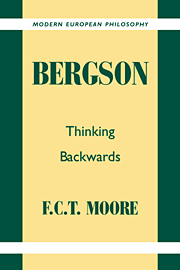Book contents
- Frontmatter
- Contents
- Abbreviations
- Preface
- Introduction
- 1 The Requirement of Precision
- 2 Philosophy and Knowledge: Uses and Misuses of ‘Representation’
- 3 Durance: Unfolding in Time
- 4 Laughter
- 5 Tension
- 6 Aporetic Philosophy
- 7 Branching
- 8 Going Beyond
- 9 Magic and the Primitive: The Antinomies of Pure Intelligence
- 10 Paradoxical Epilogue: Reason Ruefully Repressed
- Works Cited
- Index of Names
- Index of Subjects
4 - Laughter
Published online by Cambridge University Press: 05 June 2012
- Frontmatter
- Contents
- Abbreviations
- Preface
- Introduction
- 1 The Requirement of Precision
- 2 Philosophy and Knowledge: Uses and Misuses of ‘Representation’
- 3 Durance: Unfolding in Time
- 4 Laughter
- 5 Tension
- 6 Aporetic Philosophy
- 7 Branching
- 8 Going Beyond
- 9 Magic and the Primitive: The Antinomies of Pure Intelligence
- 10 Paradoxical Epilogue: Reason Ruefully Repressed
- Works Cited
- Index of Names
- Index of Subjects
Summary
(i) Bergson's Work on Laughter Is Not a Jeu d'Esprit One of Bergson's most approachable and attractive books is his book about laughter, Le rive. But it is often treated as a sort of jeu d'esprit, a minor work quite in harmony with Bergson's main philosophical works, but hardly of central interest. Such a view receives indirect support from Bergson himself. In the preface added in 1924 (a quarter of a century after the articles making up the book first appeared), he comments that he has not attempted a systematic critical account of earlier theories, since this would have produced a book ‘out of proportion to the importance of the subject-matter’. Furthermore, he does not refer in this book to other major themes or positions in his other works. Of course, this absence of cross-reference is entirely consistent with his views, already discussed, about precision in philosophy. What precision is will vary with the subject-matter. So nothing would be gained and much could be falsified by deliberately applying philosophical theses developed in another domain to the case of laughter. Accordingly, many writers on Bergson's philosophy pay little or no attention to this work.
With this in mind, when working on this book, I was in doubt about whether to explore Bergson's views about laughter. However, in pursuing the matter further, I have come to think that the case of laughter does engage and put into interesting relief a fundamental part of Bergson's thought even though Bergson himself does not make this explicit.
- Type
- Chapter
- Information
- BergsonThinking Backwards, pp. 66 - 90Publisher: Cambridge University PressPrint publication year: 1996

